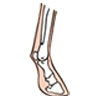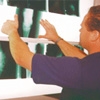|
Advice article filter
|
JointsA joint is the point of connection between two (or more) bones or elements of a skeleton (especially if it allows motion). To facilitate movement, the bones of a joint are shaped to match perfectly (ball- and socket). To strengthen the joint, the two bones are held together by a ligament that runs directly from the ball into the socket, where it attaches to the inside. Attaching to both bones and completely encircling the joint is the joint capsule, a thick band of connective tissue that holds the bones together. Large forces are put on the joints when a horse is in motion. In order to be able to function properly, it is important to keep the joints and the surrounding tissue in optimum condition.
For properly functioning joints the body needs sufficient nutrients. It is also important that your horse produces sufficient synovial fluid, for a supple, well-protected joint. Synovial fluid is a fluid within the joint, which assists in lubrication and nutrition of the joint.
Joint disorders
The onset of OC and OCD is for the most part linked to genetics, training and exercise, but nutrition plays an important role as well. The nutrition of the foal begins during his development in the uterus. Research shows that the nutrition of the pregnant mare is very important in the prevention of bone disorders of the foal when he is growing up. What can I do? Lack of certain nutrients can cause the propensity for bone disorders such as OC and OCD even in unborn foals. That is why it is so important to start feeding a well-balanced and complete diet for pregnant mares during the last months of her pregnancy. This way the foal will get all the nutrients necessary for an adequate bone growth from his mother before he is even born. 5 to 6 Weeks after the birth of the foal the mother milk contains insufficient minerals (i.e. copper) to guarantee an adequate development of the bones of her foal. Therefore we recommend that you start feeding the foal a special energy feed for foals with supporting vitamins, minerals and trace elements when he is three weeks old. This guarantees a sufficient supply of all the necessary nutrients.   |

